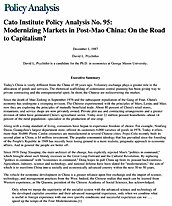Since the death of Mao Zedong in September 1976 and the subsequent repudiation of the Gang of Four, China’s economy has undergone a sweeping revision. The Chinese experimented with the principles of Marx, Lenin, and Mao; now they are exploring the principles of mutually beneficial trade. About 80 percent of China’s retail stores, restaurants, and service shops are now privately owned. Private plot use and contracting arrangements and a greater division of labor have permeated China’s agricultural sector. Today over 22 million peasant households–about 14 percent of the rural population–specialize in the production of one crop.
Along with a rising standard of living, consumers have begun to experience freedom of choice. For example, Nonfang Daxia, Guangzhou’s largest department store, offered its customers 6,000 varieties of goods in 1978. Today it offers more than 30,000. Pierre Cardin cosmetics are manufactured in several Chinese cities. Pepsi-Cola recently built its second plant in China, a $4 million investment. The popular communist ideology that has prevailed since the founding of the People’s Republic in 1949 has recently been losing ground to a more realistic, pragmatic approach to economic affairs. And in general the people are better off.
Since 1978 Deng Xiaoping, the main architect of the change, has explicitly rejected Mao’s “politics in command,” which brought about such bloody excesses as the Great Leap Forward and the Cultural Revolution. By replacing “politics in command” with “economics in command,” Denq hopes to pull China up from its peasant backwardness. Agriculture, industry, science and technology, and national defense have been slated for “modernization,” the aim of which is to transform China into a socially and economically advanced country within the next 30 to 50 years.
The vehicle for economic development in China is a greater reliance upon free exchange and the import of science, technology, and management practices from the West. Indeed, the Chinese realize that much can be learned from Western experience, as Hu Qiaomu, president of the Chinese Academy of Social Sciences, has acknowledged:

